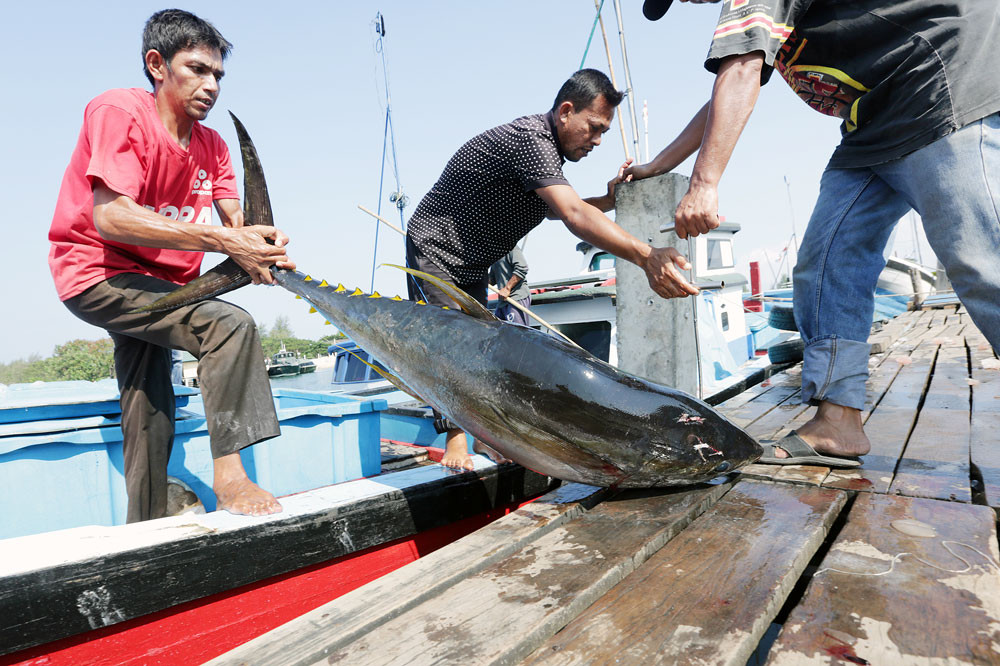Popular Reads
Top Results
Can't find what you're looking for?
View all search resultsPopular Reads
Top Results
Can't find what you're looking for?
View all search resultsOcean 20: Powering sustainable ocean for buoyant global economy
Prioritizing a sustainable ocean economy will bring multiple benefits for people, businesses, nature and the climate and the G20 can play a pivotal role in leading this agenda.
Change text size
Gift Premium Articles
to Anyone
 Fishermen unload a tuna fish from a boat at Ulee Lheu Port in Banda Aceh, Aceh, on Wednesday. FAO State of World Fisheries and Aquaculture data shows that in 2018 Indonesia had the largest commercial catch of tuna in the world, contributing 16 percent to the global tuna market.
(Antara/Irwansyah Putra)
Fishermen unload a tuna fish from a boat at Ulee Lheu Port in Banda Aceh, Aceh, on Wednesday. FAO State of World Fisheries and Aquaculture data shows that in 2018 Indonesia had the largest commercial catch of tuna in the world, contributing 16 percent to the global tuna market.
(Antara/Irwansyah Putra)

There has never been a better – and more urgent – time for building resilient growth based on the foundations of a sustainable ocean economy. That moment has come for Group of 20 countries, coinciding with the leaders’ summit in Bali during Indonesia’s G20 presidency.
We are excited about the launch of Ocean 20: an official dialogue of the G20 designed to boost lasting, equitable, resilient growth for G20 countries through a sustainable ocean economy. It is co-led by the government of Indonesia in partnership with the World Economic Forum and developed alongside country leaders, partners and other stakeholders.
The ocean already contributes massively to the global economy, through resources, jobs and livelihoods, as well as food and transport, but it also has the potential to be a major source of clean energy through wave, solar and offshore wind power. A healthy ocean is also critical to regulating the climate and weather systems and is the largest carbon sink on the planet.
Yet, several major anthropogenic drivers are causing a severe decline in the ocean’s health. These are familiar to us all: Rampant global warming causing climate change, which, in turn, accelerates ice melt, rising sea levels and acidification. Much of the world’s pollution, from plastics to chemicals and more besides, ends up in the ocean. While the overexploitation of marine biodiversity, especially through overfishing and the lack of cohesive and sustainable harvesting strategies, is causing significant species decline.
Business and government leaders on the global stage – as well as at local, national and regional levels – can and must play a definitive role in reversing this paradigm. Individually and together, G20 leaders across sectors can address market drivers and improve business operations; ensure effective governance, policy design and implementation; and, increase the adaptability and resilience of ocean and coastal ecosystems through sound, sustainable practices.
We must all hold each other to account, for the sake of our children and generations to come, as much as for the long-term viability of businesses and economies. We cannot live or prosper without a healthy, thriving ocean.
Prioritizing a sustainable ocean economy will bring multiple benefits for people, businesses, nature and the climate and the G20 can play a pivotal role in leading this agenda. G20 countries are all coastal states, with 45 percent of the world’s coastlines among them, and they hold jurisdictional responsibility over 21 percent of exclusive economic zones.
The G20 also accounts for 60 percent of the world’s population and 80 percent of the world gross domestic product, 80 percent of global carbon emissions and 75 percent of global trade.
By leading the way with a sustainable ocean economy, G20 leaders can light the path ahead and demonstrate that it makes business sense, as much as social and environmental sense. Everything is connected.
Ocean 20, the new sustainable growth strategy for the G20, led by the World Economic Forum with the government of Indonesia, is launching on Nov. 14, ahead of the G20 Leaders' Summit in Bali, Indonesia. It is being proposed as an official dialogue of the G20 to be passed between presidencies.
Ocean sustainability must be on the agenda of global public and private sector leaders for the lasting prosperity of people and the planet alike.
***
Gim Huay Neo is managing board, head of Centre for Nature and Climate, World Economic Forum. Nicolas Meyer is managing director and partner, Boston Consulting Group.










